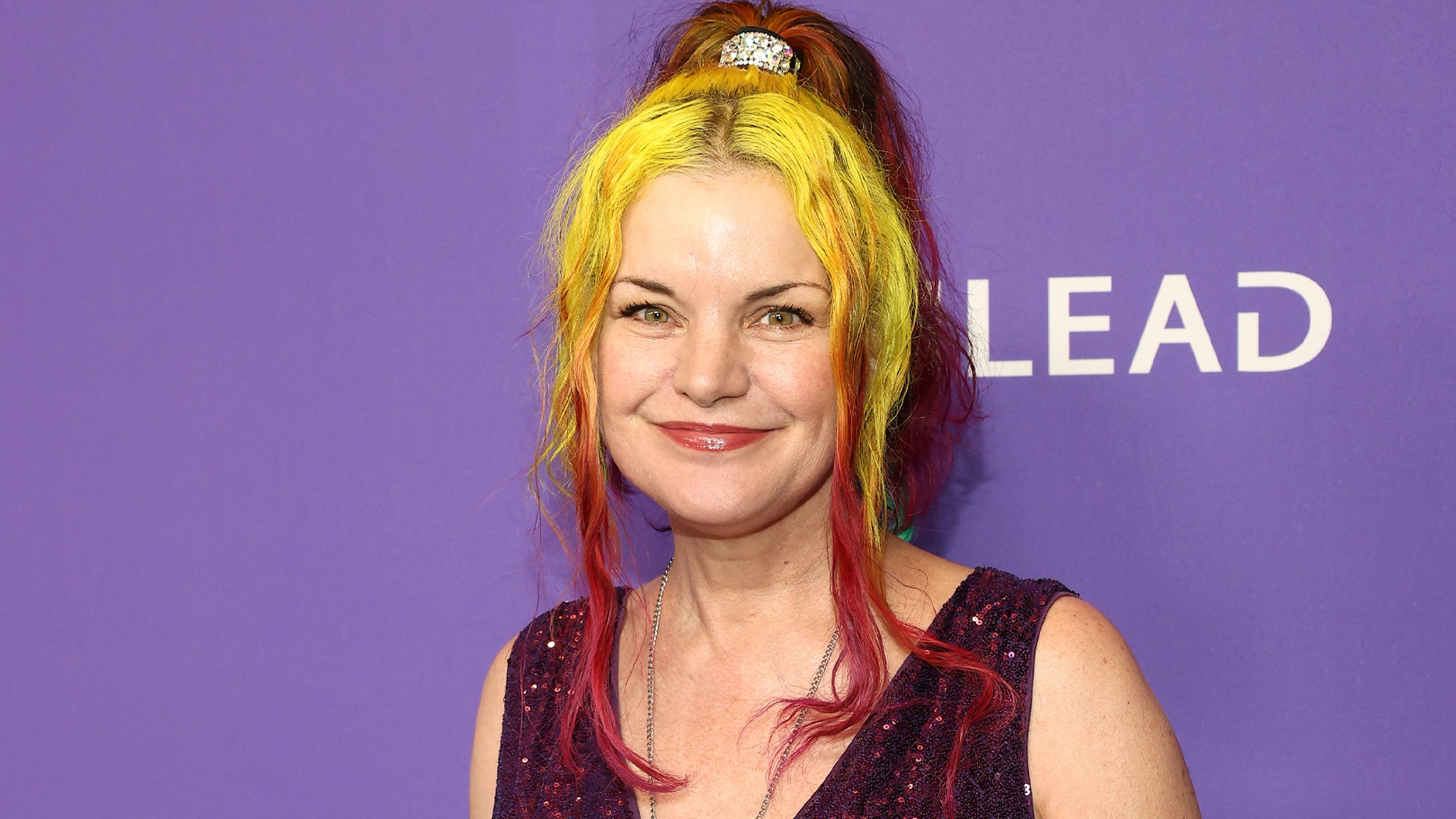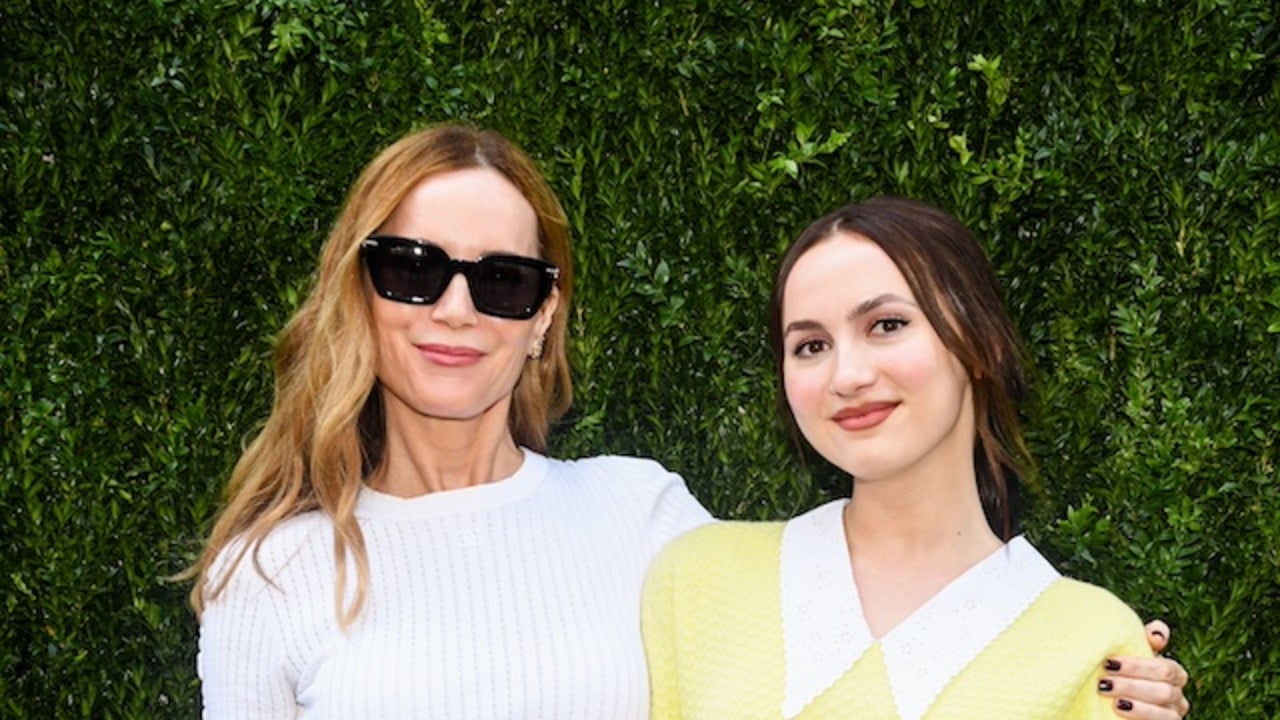[ad_1]
In the Jewish faith you become an adult at the most awkward possible moment: when you turn 13. Sure, in the eyes of God and your Hebrew school, you are mature enough to read from the Torah and embrace the responsibilities of grown-up life. But in reality you’re probably a scared kid for whom true maturity is far off, despite all those uncomfortable hormones.
That was the case when I was bat mitzvahed in 2003 — mortifyingly (but also with a hint of pride) getting my first period shortly before the event — and that’s the case in the new Netflix film “You Are So Not Invited to My Bat Mitzvah,” based on the 2005 young adult novel by Fiona Rosenbloom.
The movie, directed by Sammi Cohen, is the story of Stacy Friedman, played by Sunny Sandler. (Sunny is the daughter of Adam Sandler, who plays her dad in the film. Her real life-sister, Sadie, has been cast as her movie sibling, Ronnie. Their mother, Jackie Sandler, also in the cast, portrays a different girl’s mom — the role of Stacy’s mom went to Idina Menzel, who played Adam’s wife in “Uncut Gems.” Got all that?)
Stacy has long dreamed of a blowout bat mitzvah alongside her best friend, Lydia Rodriguez Katz (Samantha Lorraine), but the messy realities of middle school meddle with their party plans. There are ill-advised crushes, moments of embarrassing flirtation and the kind of humiliating cruelty that only a 13-year-old with a grudge can muster. Eventually, Stacy takes the bimah at her bat mitzvah to read her Torah portion, and she learns the kinds of life lessons that come when you’ve emerged from the navel-gazing cocoon of youth.
“You Are So Not Invited to My Bat Mitzvah” proves, as other movies and shows have before it, that when a bar or bat mitzvah is depicted onscreen, it can often be a savvy vessel for exploring the funny, strange or even traumatic transition from childhood to teenagedom.
“Figuring out, who am I, who I want to be — such a Jewish experience,” Cohen, who uses they/them pronouns, told me in an interview, adding that it’s “also just a human experience.”
“We don’t all have a bat mitzvah,” they continued, “but we all feel awkward when we have to step out in front of our friends and family and try not to make a mistake.”
At the same time, Hollywood can get too caught up in the lavish spectacle of these affairs, with depictions that sap them of their cultural or emotional significance in favor of gags about the superficiality of the post-service party. The spoiled bar or bat mitzvah boy or girl is a trope that comes up repeatedly. In a 2000 “Sex and the City” episode, Samantha (Kim Cattrall) faces off against a rich brat (Kat Dennings) who is hiring a publicist for her bat mitzvah party. “I want it all, I want it now, and I want you to get it for me,” the girl says.
During a 2012 episode of “30 Rock,” Tracy (Tracy Morgan) and Jenna (Jane Krakowski) humiliate themselves at a bar mitzvah playing Transformer robots for the demanding son of their accountant. The films “Starsky & Hutch” (2004) and “Safe Men” (1998) found gags in criminals attending bat and bar mitzvahs.
The b’nai mitzvah party gone wild — celebrating a bat or bar mitzvah — is another staple of the genre. “Keeping Up With the Steins” (2006), directed by Scott Marshall, starts from a place of absurdity with an outlandish “Titanic” movie-themed soirée attended by the Fiedler family. The dad, an “Entourage”-era Jeremy Piven essentially playing a flavor of Ari Gold, does all he can to match the grandiosity of that event for his son. In the process he reconnects with his own father (Garry Marshall), a reunion facilitated by his child (Daryl Sabara). It’s a thin narrative that uses the hook of the over-the-top bar mitzvah for a trite family tale.
Financial anxiety is a feature of similar narratives, and it is possible to find nuance in the strange mix of faith and capitalism that b’nai mitzvah spur in Jewish American culture — mostly when the writers, directors and performers lean into what a confusing time it is for the teenagers for whom these ceremonies are ostensibly intended.
The Hulu series “Pen15” is a masterpiece of discomfort — augmented by the fact that its creators and stars, Anna Konkle and Maya Erskine, are 30-something actors playing 13-year-olds in middle school. Their characters are not Jewish, but the gawky unease they cultivate is on full display during the episode chronicling the bat mitzvah of a popular girl named Becca (Sami Rappoport), a moment that coincides with their class learning about the Holocaust. The lesson about genocide makes Anna (Konkle) contemplate the very existence of God. The occasion brings on a different kind of unease for Maya (Erskine), who is desperate to impress Becca with a fancy gift despite the fact that it’s a stretch for her parents. “Pen15,” which takes place in the early 2000s, nails the cringe-worthy elements of bat mitzvah-going, whether it’s Becca entering her party belting a song from “Damn Yankees” or the mechanical slow dancing. But at the same time it explores how fraught the tradition can be when it comes to social class.
Still, the episode focuses on an outsider’s experience of a bat mitzvah, not an actual Jew’s. So does Cooper Raiff’s 2022 directorial effort, “Cha Cha Real Smooth,” in which he also stars. It’s a bar mitzvah movie with thin acknowledgment of Jewish tradition. Raiff’s aimless college grad Andrew — who is not Jewish — gets a job as a party starter for b’nai mitzvah receptions. It’s a good backdrop for Andrew’s own insecurities; he knows just as little about life as the much younger people around him. But it’s also just that: a backdrop.
To find a movie that incorporates a bar mitzvah in the fabric of its Jewishness, look to the Coen brothers’ “A Serious Man” (2009), a chronicle of Larry Gopnik (Michael Stuhlbarg), a professor in 1967 Minnesota. Larry’s son Danny (Aaron Wolff) gets extremely stoned before his bar mitzvah. It’s the kind of stupid thing a little twerp would do, but the disorienting way the Coens film this sequence — with fuzzy visuals and oblique angles — feels like an introduction to a faith of questioning that can itself be disorienting, especially as Danny meets with the aged Rabbi Marshak (Alan Mandell), who starts reciting Jefferson Airplane’s “Somebody to Love” as a prayer.
For an even bleaker depiction, there’s Todd Solondz’s “Life During Wartime” (2010), where the bar mitzvah of Timmy (Dylan Riley Snyder) coincides with horrific realizations about his father. Timmy’s perception of becoming a man, as he describes in a speech he’s writing for the occasion, is standing up for yourself even if it means getting “just plain tortured.” Solondz’s view is clear: Growing up is pain. There’s less of an engagement with the nature of Judaism here than there is in “A Serious Man,” but Solondz scores sequences with Avinu Malkeinu, a Jewish prayer of repentance usually uttered on the High Holy Days, which serves as a reminder of the human failure on which the director fixates.
It’s hard to get darker than what Solondz delivers, but even some of the cheeriest b’nai mitzvah stories can have a touch of the grim. In “You Are So Not Invited to My Bat Mitzvah,” Stacy lashes out at Lydia over a boy, spreading gossip about her and making an embarrassing video that ends up being played on Lydia’s big night. Her petulant acts may seem minor but they have real stakes, as anyone who has ever been betrayed by a friend knows. “Real kids are complicated and messy,” Cohen told me.
And it’s true. I have warmly nostalgic memories of my own bat mitzvah that are mixed up with more complicated feelings. I think about a connection to faith that I let lapse and relatives who are no longer alive. I think about the friends with whom I have lost touch. I remember the world in front of me and it being exciting but also so scary. That’s the thematic potential in a b’nai mitzvah, and it’s nice to see that occasionally filmmakers get it right.
[ad_2]
Source link





















